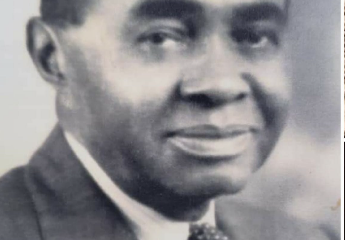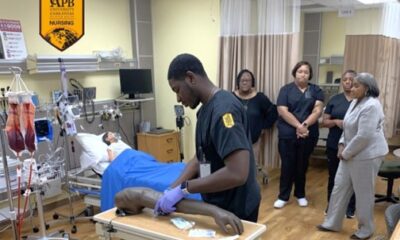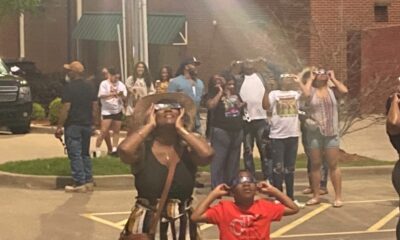Featured
Will Black Voters in Michigan Flex Their Muscles?

Jannie Jones deserves a place in the history books next to House Majority Whip James Clyburn (D-SC). She is the Black woman in South Carolina who inspired the public endorsement for former Vice President Joe Biden heard around the country. She is a sistar.
Jones whispered a request at a funeral for Clyburn’s accountant. As the third most powerful lawmaker behind Speaker Nancy Pelosi tells it, she asked, “…who are you going to vote for next Saturday? I have been waiting to hear from you. I need to hear from you. I decided then and there that I would not stay silent.” This exchange sparked one of the most eloquent rationales for voting.
In Clyburn’s endorsement speech, he pointed out that, “Our challenge is making this country’s greatness accessible and affordable for all. If it’s health care, is it accessible? Is it affordable? Education, is it accessible, is it affordable? Housing, energy making [it] accessible and affordable.” The South Carolina lawmaker reminded us of the higher purpose for voting. Casting a ballot is a means to picking a leader and representative.
Peggy Noonan, former speechwriter for Presidents George H.R. Bush and Ronald Regan, wrote the first draft of this historic moment in a Wall Street Journal column, worth talking up and posting on social media. Anyone who cares about the direction of our country, community and family should use this article to have conversations with white women, the largest demographic group in the 2020 general election.
Noonan’s piece provides a much-needed conversation starter to move from the retail part of the presidential race to the November election. She confronts the resentment captured on social media, calling it a “’whiff’ of Who are these old Southern black ladies to be calling the shots.”
Voters in South Carolina, Alabama, North Carolina and Virginia answered this question, giving their candidate decisive victories on Feb 29th and March 3rd. As the pollster Cornel Belcher notes, Black women are the most likely voters, going to the polls in the highest percentage of any group.
Now six more states vote on March 10th. Michigan, the biggest delegate-prize, and Mississippi have significant Black electorates. Detroit is not only the largest city in Michigan, but also ranks as the nation’s largest predominantly Black city with 78.6 percent of its population African American. With 38 percent of its residents Black, Mississippi holds a similar position as the state with the highest percent of African Americans.
Depending on who goes to the polls in the primaries in the first swing state in the Midwest and Mississippi, Biden can extend his frontrunner status with more delegates or Vermont Senator Bernie Sanders can close the 76-delegate gap between contestants. In the first scenario, the momentum, fueled by Black voters in Michigan and Mississippi, continues to propel the former Vice President. A slew of endorsements from former presidential candidates, like former New York Mayor Michael Bloomberg, Senators Kamala Harris and Corey Booker, to Biden may contribute to the feeling of inevitability. But the race is not over.
Vermont Senator Bernie Sanders could repeat his surprise 2016 finish with another 2020 win in Michigan and finish better than expected in Washington state and Missouri, the second and third largest primaries competing on March 10th. So much turns on how many Black voters in Detroit cast ballots.
At this point, anything is possible. In the 2020 election cycle, the frontrunner has changed several times from former South Bend Mayor Pete Buttigieg to Sanders and now Biden.
To win the Democratic Party’s nomination for president in July, a candidate needs 1991 out of 3,979 pledged delegates on the first ballot at the National Democratic Convention in Milwaukee. So far, 1409 Democratic pledged delegates have been selected in primaries and caucuses. Biden leads Sanders in the delegate count by 670 to 574.
Momentum generated by past victories plays a role in the presidential race. Although the field has narrow down to a two-man race with a clear frontrunner, the presidential primaries are not even at halftime yet. Let’s keep the power, let’s keep voting.
Holli L. Holliday is a practicing attorney and president of Sisters Lead Sisters Vote, a nonprofit c4 organization for, by and of black women.

-

 Black History5 months ago
Black History5 months agoThe untold story of a Black woman who founded an Alabama hospital during Jim Crow
-

 Featured9 months ago
Featured9 months ago‘No Closure’ In Town Where Five Black Residents Were Either Murdered, Died Suspiciously Or Are Missing
-

 Black History10 months ago
Black History10 months agoBlack History Lost and Found: New Research Pieces Together the Life of Prominent Texas Surgeon and Activist
-

 Featured9 months ago
Featured9 months agoFounder of “The Folding Chair” Podcast Calls Montgomery’s Brawl ‘Karma’
-

 Featured9 months ago
Featured9 months agoThousands ‘Live Their Dream’ During National Black Business Month
-

 Featured11 months ago
Featured11 months agoJuneteenth And ‘246 Years Of Free Labor’ Are Key To Conversations About Reparations









